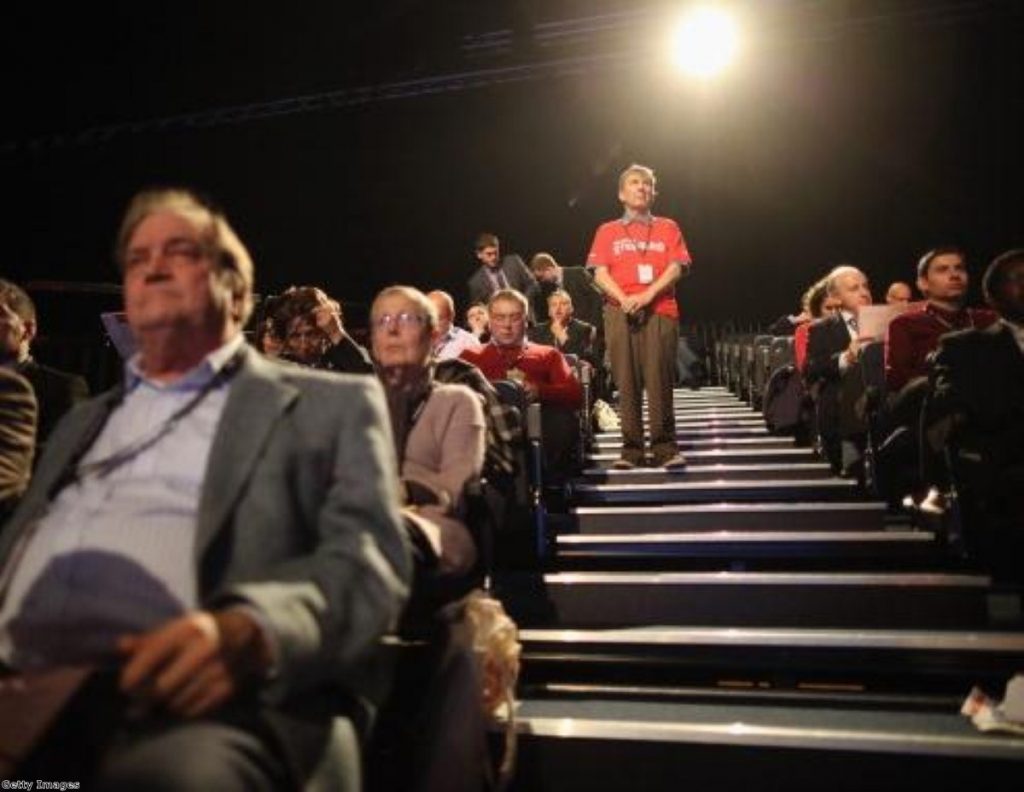Labour 2012: Out of power and short of policies
Labour's third annual conference out of power is proving a flat affair. Party morale is slowly rebuilding after its ejection from power in 2012, but the long wait until the next contest is making the opposition sag in the middle.
Talking to activists in Manchester, one theme quickly becomes clear: the ongoing policy review is at the heart of Labour's limbo. The lack of policies is damaging the party's standing with voters, but it also has a less another, less documented, impact, too: the party's delegates are feeling the absence. Only the vaguest principles can be agreed upon: there is no determined programme of government. Miliband is not a man with a plan. His party has not united behind an agenda.
It may be a necessary evil. "This has to be thought through properly – you can't just keep coming back and saying 'I'm sorry'," Ibrar Hussain, one of 60 Labour councillors in Sheffield, explains. "When the next election comes up, we can say this is what we can deliver, and what we will deliver." He's in no hurry. That attitude reflects the knock-on consequences of a fixed-term parliament: it's hard to imagine the opposition being as lacksadaisical if there was a chance the prime minister could call a general election at the drop of a hat.
That isn't the case, so Labour is taking its time. Liam Byrne has stepped back from handling the policy review process, giving Jon Cruddas – a nuanced champion of the Labour left – taking over the process. His work is wholeheartedly supported by Natan Doron, a senior researcher at the Fabian Society. "What's important is under Jon Cruddas, we're now looking at the broad vision stuff that can help unite it [the party]," he says. Doron acknowledges that the process is not an easy one. "One of the problems is the context of the fiscal environment. It's a very difficult time," he says. "So Labour's having to learn to do a new kind of politics – it can't promise and redistribute like we used to. That's why ideas like predistribution are so important."


Predistribution: this is the intellectual framework which could underpin Labour's new kind of politics in an era where they can't simply transfer the profits of an economic boom from the pockets of the rich to those of the poor. Even pundits like Rafael Behr, the political editor of the New Statesman, are unconvinced it will prove that useful. "It's bloody hard to explain and you can't get it across in seven seconds on the sofa of a breakfast television programme, which is what an effective communication in politics is these days," he explains. Predistribution might be a very clever idea, but when presented by the awkwardly wonkish Miliband it can come across as a little geeky.
"Can the guy just speak English and in a way that resonates at the kitchen table?" Behr asks. "Ed Miliband hasn't yet found a way of automatically expressing his politics through those terms – he has to try and translate it, and it sometimes comes across like those Google translations – not what most people consider normal English."
Being the heir to Tony and Gordon is not proving an easy task. Miliband has had to play a careful game as leader of Labour's 'broad church'. The unions need dealing with; thorny questions like whether to support public sector strikes, and even whether to address the spending cuts protest coming up on October 20th, need dealing with carefully. Outgoing TUC general secretary Brendan Barber isn't sure if Miliband will speak, but he certainly hopes so.
"There was disquiet earlier in the year when Ed Balls talked about wanting to stick with the current coalition government policies on pay restraint, in particular, over this next period," he says at the TUC stand. "I understand that a prospective chancellor doesn't want to bind themselves to decisions ahead of the next general election on spending plans until they're an awful lot clearer about what the economic situation is closer to the time. But we didn't think it was necessary to commit themselves in quite the way they did."
The economic situation is not making life easy for Labour. The double-dip recession is troubling delegates. Richard Umpleby, from Stalybridge, fears that Labour's attempts to rebuild its relationships with communities are encountering headwinds as a result of the public's 'a plague on all your houses' attitude to politicians. Labour would have made 80% of the coalition's spending cuts, after all.
"Getting people involved in politics, generally, is not working that well," he worries. "The grassroot level of the Labour party has always turned out and voted, but it's getting the general populace to go out and do it…"
There are signs that these headwinds may even be affecting some of the party faithful. Dilys Fletcher, from Oldham, is happy to talk about the problems she sees as afflicting Labour. She doesn't think the party as a whole is mobilised. "You have to have the entire party, from the young to the old, wanting that win," Dilys says. She's worried about the New Labour government's "broken promises" and doesn't think it's worth bothering campaigning again. "I feel I can't promise that this shadow Cabinet will really deliver what they're telling me to go out and knock on doors and promise," she says. "That's exactly how I feel."
Dilys will be in a minority. There are other veterans who are determined to be upbeat: David Sandford, for example, who is "looking optimistically to the future" despite the "very thorough" nature of the 2010 general election defeat. "We are learning, and we must be prepared to go on learning," he says. Halfway through this parliament, it feels like that process is taking a long time.









